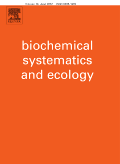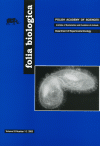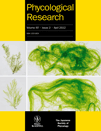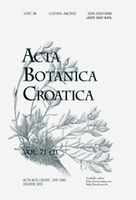
BIOCHEMICAL SYSTEMATICS AND ECOLOGY
Scope & Guideline
Connecting Biochemical Insights with Ecological Understanding
Introduction
Aims and Scopes
- Chemotaxonomy:
The journal extensively covers studies that investigate chemical compounds in plants and fungi to aid in taxonomic classification and identification, providing insights into evolutionary relationships. - Phytochemistry:
Research published in the journal explores the chemical profiles of various plant species, emphasizing the identification and characterization of secondary metabolites and their biological activities. - Ecophysiological Studies:
The journal includes studies that examine how environmental factors influence the biochemical composition and physiological traits of plants, highlighting the interaction between organisms and their habitats. - Bioactivity Assessment:
Many articles focus on the biological activities of chemical constituents, including antimicrobial, antioxidant, and anticancer properties, contributing to the understanding of their potential therapeutic applications. - Metabolomic Approaches:
Utilizing advanced metabolomic techniques, the journal publishes research that analyzes the metabolic profiles of plants and fungi, offering insights into metabolic adaptations and variations.
Trending and Emerging
- Sustainable and Eco-friendly Applications:
There is a growing emphasis on the sustainable use of plant resources, including studies on bioremediation, essential oils, and their applications in pest control, aligning with global sustainability goals. - Advanced Analytical Techniques:
The use of high-throughput and advanced analytical methods, such as UPLC-MS/MS and metabolomics, has increased, allowing for more detailed and comprehensive analyses of chemical constituents. - Impact of Climate Change on Phytochemistry:
Research exploring the effects of climate change on the biochemical composition of plants is emerging, highlighting the need to understand how environmental stressors influence plant chemistry. - Endophyte and Fungal Studies:
There is a rising interest in the chemical constituents and bioactivities of endophytic fungi, reflecting a broader exploration of microbial contributions to plant health and chemical diversity. - Phytochemical Variation and Adaptation:
Studies focusing on phytochemical variations in response to ecological factors are gaining traction, emphasizing the adaptive strategies of plants in changing environments.
Declining or Waning
- Traditional Ethnobotany:
Research related to traditional uses of plants in indigenous cultures has become less frequent, possibly due to a shift towards more scientifically rigorous biochemical studies that emphasize empirical data. - General Biodiversity Studies:
While biodiversity is a crucial area, publications that do not focus on the biochemical aspects or specific chemical analyses have seen a decrease, indicating a trend towards more specialized research. - Soil Microbial Interactions:
Studies exploring the interactions between soil microbes and plant biochemical processes are less represented, which may reflect an increasing specialization in either plant or microbiological research.
Similar Journals

Journal of Fungi
Advancing Mycology Through Open Access ResearchJournal of Fungi is a premier open-access journal published by MDPI, dedicated to advancing the understanding of fungal biology in its myriad forms. Since its inception in 2015, it has become a vital resource in the fields of ecology, evolution, and plant sciences, attaining notable rankings in Scopus, including Q1 status in Ecology, Evolution, Behavior and Systematics, and Plant Science, with a Q2 ranking in Microbiology (medical). The journal fosters a collaborative platform for researchers, professionals, and students by providing unrestricted access to high-quality, peer-reviewed articles, which encourages the dissemination of innovative findings and methodologies relevant to fungal research. Designed to cater to a global audience, the Journal of Fungi has established its significance in the scientific community, especially from its base in Switzerland, where it continues to contribute to the ongoing discourse in mycology and beyond. With its commitment to open access since its launch and its continuous support for groundbreaking research, the journal plays a crucial role in driving forward the scientific inquiry and ecological awareness in fungal studies.

Vestnik Tomskogo Gosudarstvennogo Universiteta-Biologiya
Advancing Biological Insights for a Sustainable FutureVestnik Tomskogo Gosudarstvennogo Universiteta-Biologiya is a prominent peer-reviewed journal dedicated to advancing knowledge in the fields of Agricultural and Biological Sciences, Biochemistry, and Environmental Science, published by TOMSKIJ GOSUDARSTVENNYI UNIV in the Russian Federation. With an ISSN of 1998-8591 and an E-ISSN of 2311-2077, this journal serves as a vital platform for researchers to disseminate findings that encompass diverse biological disciplines. Although currently categorized in the fourth quartile across several fields, including Agricultural and Biological Sciences (Q4) and Environmental Science (Q4), the journal is committed to improving its academic impact and visibility. Its publication spectrum includes significant contributions from both local and international scholars, fostering a rich exchange of ideas and research methodologies. Access to the journal’s content is unrestricted, providing valuable resources for students, professionals, and researchers alike. As the journal converges its focus from 2018 to 2024, it aims to enhance its academic stature while contributing rigorously to contemporary biological research.

FOLIA BIOLOGICA-KRAKOW
Bridging disciplines in the ever-evolving field of biology.FOLIA BIOLOGICA-KRAKOW, published by the renowned Polish Academy of Sciences, Institute of Systematics and Evolution of Animals, serves as a pivotal platform for advancing research in the fields of Biochemistry, Genetics, and Molecular Biology. Since its inception in 1953, this journal has consistently contributed to the academic dialogue, focusing on a diverse range of topics, including evolutionary biology, molecular genetics, and ecological biochemistry. Although currently classified in Q4 quartiles according to the 2023 categorizations in both Biochemistry, Genetics and Molecular Biology (miscellaneous) and Medicine (miscellaneous), its dedicated efforts to disseminate critical findings and foster scholarly exchange ensure its relevance and growth in the scientific community. FOLIA BIOLOGICA-KRAKOW is not Open Access, but researchers can access its publications through institutional subscriptions or library services, making it a valuable resource for scientists seeking to enrich their understanding of biological processes. With its commitment to excellence and innovation in biological research, this journal remains an essential reference for researchers, professionals, and students alike, contributing significantly to the evolution of contemporary biological sciences.

TURKIYE ENTOMOLOJI DERGISI-TURKISH JOURNAL OF ENTOMOLOGY
Connecting Science and Agriculture through EntomologyTURKIYE ENTOMOLOJI DERGISI - TURKISH JOURNAL OF ENTOMOLOGY is a distinguished journal published by the Entomological Society of Turkey in collaboration with Ege University, dedicated to advancing the field of insect sciences. With an ISSN of 1010-6960 and E-ISSN 2536-491X, this journal plays a pivotal role in disseminating groundbreaking research in entomology, particularly focusing on the diverse aspects of insect biology, ecology, and their applications in agriculture. As a member of the Q3 category in Insect Science according to the 2023 quartiles, it ranks in the 40th percentile of its field, indicating its growing influence and importance within the scientific community. The journal's scope encompasses innovative research findings, reviews, and short communications that contribute to the understanding and management of insect species. While not currently open access, it serves as a vital resource for researchers, professionals, and students seeking to stay informed about the latest developments in entomology from Turkey and beyond, with a commitment to maintaining high scholarly standards through rigorous peer review processes.

International Journal of Biology and Chemistry
Fostering Innovation in Biological and Chemical SciencesInternational Journal of Biology and Chemistry (ISSN: 2218-7979; E-ISSN: 2409-370X) is a distinguished peer-reviewed journal published by AL-FARABI KAZAKH NATIONAL UNIVERSITY, dedicated to advancing the interdisciplinary fields of biology and chemistry. This journal aims to foster a comprehensive understanding of biological systems and chemical processes, thereby promoting collaborative research and innovative methodologies. With a rigorous selection process and commitment to quality, the journal provides a platform for original research articles, reviews, and case studies that contribute to the scientific community's knowledge base. Although specific metrics such as H-Index and Scopus rankings are currently not listed, the journal continues to be an important resource for researchers, professionals, and students alike. By providing open access to high-quality research outputs, the International Journal of Biology and Chemistry is poised to make a significant impact in its field, bridging gaps between biological sciences and chemistry while encouraging groundbreaking discoveries.

PHYCOLOGICAL RESEARCH
Unveiling the mysteries of phycology and ecology.PHYCOLOGICAL RESEARCH is a leading journal in the field of aquatic and plant sciences, published by Wiley, recognized for its commitment to advancing knowledge in the study of algae and their ecological significance. With a diverse scope encompassing ecological interactions, evolutionary behaviors, and physiological processes, PHYCOLOGICAL RESEARCH aims to provide a platform for researchers to disseminate innovative findings and insights pertinent to both agricultural and biological sciences. The journal's impressive rankings—placing it in the 74th percentile within Agricultural and Biological Sciences (miscellaneous) and holding a Q2 category in key fields—underscore its impact and importance in academia. Despite not being open access, the journal ensures broad distribution and visibility through its dedicated readership. Since its inception in 1995, PHYCOLOGICAL RESEARCH has continuously evolved, shaping and influencing the direction of research in phycology and related disciplines, making it an essential resource for students, professionals, and researchers alike.

ZHURNAL OBSHCHEI BIOLOGII
Fostering Collaboration in Biological SciencesZHURNAL OBSHCHEI BIOLOGII, published by MEZHDUNARODNAYA KNIGA in the Russian Federation, is a venerable journal with a rich history originating in 1945. Renowned for its contributions to the fields of Ecology, Evolution, Behavior, and Systematics, as well as Medicine (miscellaneous), this journal provides a platform for researchers and professionals to disseminate significant findings within these domains. Although currently not classified as an open access publication, ZHURNAL OBSHCHEI BIOLOGII holds a Q4 quartile designation in its respective categories, reflecting its unique positioning within the global research landscape. While its coverage in Scopus is limited, the journal remains an important resource for academics interested in the evolution of biological sciences, especially within the context of Russian research traditions. By fostering scholarly communication and collaboration, ZHURNAL OBSHCHEI BIOLOGII continues to play a critical role in advancing knowledge in the biological sciences.

ACTA BOTANICA CROATICA
Fostering Collaboration in Botanical ResearchACTA BOTANICA CROATICA is an esteemed interdisciplinary journal dedicated to the exploration and advancement of botanical sciences, published by UNIV ZAGREB, FAC SCIENCE, DIV BIOLOGY. Since its inception, this journal has embraced an Open Access model, enabling researchers and the global scientific community easy and unrestricted access to cutting-edge findings in plant biology, ecology, and evolutionary studies since 2011. Covering a broad spectrum from plant science to ecological and evolutionary behavior, ACTA BOTANICA CROATICA holds an important position in the academic landscape, currently classified in the Q3 quartile for both Ecology, Evolution, Behavior and Systematics and Plant Science categories. With a robust ranking in Scopus, it stands at #246 out of 516 in Plant Science and #360 out of 721 in Ecology, showcasing its commitment to quality research dissemination. The journal invites contributions from researchers, professionals, and students aiming to broaden the horizons of botanical research and foster collaboration within the scientific community.

YEAST
Exploring the intricate world of yeast and its applications.YEAST is a renowned peer-reviewed journal published by WILEY, dedicated to advancing the understanding of yeast biology and its applications in various scientific fields. Since its inception in 1985, YEAST has significantly contributed to the disciplines of microbiology, biotechnology, biochemistry, and genetics, achieving respectable rankings within its categories, including Q2 status in Applied Microbiology and Biotechnology and Q2 in Biotechnology as of 2023. With an emphasis on high-quality research, it explores diverse aspects of yeast organisms, from their cellular mechanisms to biotechnological applications. Although it does not currently offer an open-access option, the journal provides valuable insights and findings that are applicable to both academia and industry, making it an essential resource for researchers, professionals, and students interested in the functional and applied dimensions of yeast. With its editorial rigor and commitment to quality, YEAST continues to be a vital platform for disseminating innovative research that shapes future biotechnological advancements.

Botanical Studies
Unlocking the Secrets of the Plant KingdomBotanical Studies is a premier open-access journal published by Springer, dedicated to the field of botany and plant sciences. Since its establishment in 2006, the journal has championed innovative research and scholarship that explores diverse botanical topics ranging from plant systematics to ecology and conservation. With a commitment to broad accessibility, it promotes the dissemination of knowledge to researchers, professionals, and students worldwide. Botanical Studies fosters academic collaboration and dialogue, contributing significantly to the global botanical community. Its open-access policy allows unrestricted access to its high-quality, peer-reviewed content, ensuring that vital research is available to all. Join the growing community of scholars advancing botanical science through this essential publication, conveniently located at One New York Plaza, Suite 4600, New York, NY 10004, United States.